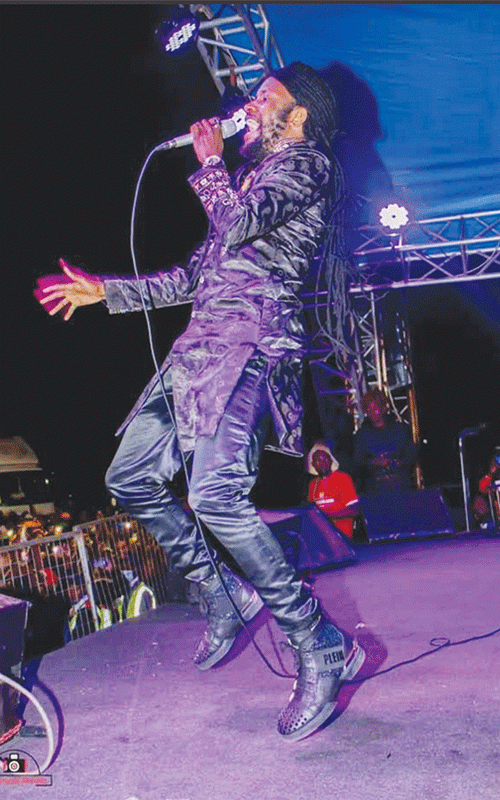
PROMINENT Zimbabwean musician Wallace Chirumiko — popularly known as Winky D or The Big Man — had his show at Damview in Chitungwiza shut down on March 4, 2023 after he had started performing his hit song Ibotso, which refers to State-sanctioned corruption.
It’s no surprise, given the ruling Zanu PF party’s typical stifling of any criticism of its actions as it ramps up repression in an election year.
It shows the extent to which music plays a significant role in political struggles, a theme that is historical across sub-Saharan Africa — thinking back to the days of the struggle when song and dance played a motivational role during many countries’ fight for independence.
When it’s muzzled by government, it does not only trample on the right to freedom of expression, but it blocks an important channel through which matters of public interest, such as political corruption, can be addressed.
Music has historically played a significant role in the political life of Zimbabwe, serving as a means of articulating the plight of the colonised population during British rule (1923-1980).
In 1979, the government in what was then called southern Rhodesia banned Chimurenga musician Thomas Tafirenyika Mapfumo’s song Hokoyo.
In it, Mapfumo uses idioms like “nyoka musango”, which loosely translates to “snake in the bush” referring to colonial fighters.
Musicologists observe that Mapfumo’s music reflects his dissent during the Second and Third Chimurenga wars of liberation.
- Beijing’s policy destroying Tibet’s environment
- Huayou Cobalt to inject US$300m into lithium project
- Feature: Lithium: Chinese lead scramble for Zim assets
- Fake Gaffa challenges Winky D
Keep Reading
In Zimbabwe’s first year of independence in 1980, Jamaican reggae giant Bob Marley and The Wailers even chose to fly to Harare (then Salisbury) to perform their album Survival .
The cover of the album comprises the flags of several African nations that had gained independence.
In the song Zimbabwe, Bob Marley and The Wailers articulates the importance of fighting for freedom:
“We gon’ fight (we gon’ fight), we’ll have to fight (we gon’ fight) We gonna fight (we gon’ fight), fighting for our rights.”
Music continued to serve as a medium and tool through which revolutionaries and activists in Zimbabwe address injustices within the country.
But it faced incessant repression, as former President Robert Mugabe’s (1980-2017) authoritarian regime did everything in its power to muzzle any criticism of Zanu PF.
Mapfumo’s artistic expression did not stop after independence.
He continued to represent the voiceless in Zimbabwe after independence through artistic means.
During Mugabe’s 37-year rule, Mapfumo’s music continued to be scrutinised by the regime.
In particular, the Mugabe administration sought to censor songs like Corruption, which contained the lyrics: “Munyika muno maita corruption” (there is corruption in this country); and “munyika muno maita disaster” (in this country there are serious plagues/national problems).
Other vocal artistes on Mugabe’s radar included Oliver Mtukudzi in particular his song Bvuma Wasakara (Accept you are now old), which was banned.
Mugabe’s regime banned this song because a majority of Zimbabweans began to refer to him as an old man and by association, unfit to continue in office.
Kusakara means to become useless in Shona. For example, when referring to a table cloth, it would mean the cloth has reached a state of wear and tear that is beyond repair and no longer able to serve its purpose. This was analogous to Mugabe.
And given this backdrop of repression, Zimbabweans were elated when in 2017 Mugabe was forcibly removed from power.
But can a leopard change its spots?
After Emmerson Mnangagwa, who held senior positions in the Mugabe regime, took over the reins, artistic expression continues to be undermined.
This is contrary to Zimbabwe’s Constitution which asserts under section 61(1)(b) that “everyone has the right to freedom of expression, which includes — freedom of artistic expression and scientific research and creativity”.
Sensing a change in the regime, Mapfumo, while still in exile, in 2018 in the lead-up to general elections that same year released a song titled Chauya Chauya, in which he sings “Yavesarudzo MuZimbabwe, Sarura Wako Waunoda” (It is time for elections in Zimbabwe, vote for the person you want).
However, 43 years since gaining its independence, artistic expression continues to be stifled in Zimbabwe despite a change in regime — as evidenced by the shutdown of Winky D’s performance.
Winky D’s song Ibotso refers to repercussions for beating one's mother — it is a taboo in Zimbabwean culture for a child to beat their biological parents. Winky D exposes his anti-corruption stance and refers to the current reality in Zimbabwe in which the general population is suffering owing to the political elite looting the country’s wealth as evidenced by the four-part Gold Mafia documentary released by international news outlet Al Jazeera recently .
In the song Ibotso, Winky D speaks about kudya zvevapfupi nekureba, which basically means taking what belongs to the weak/majority using power and position of authority.
This song is widely perceived as a direct jab at the Mnangagwa administration.
The decision to disrupt Winky D’s show in Chitungwiza shows that artistic expression has been under threat in Zimbabwe for decades.
Though there is a call on Home Affairs minister Kazembe Kazembe to explain why Winky D’s concert was disrupted, there is little hope that this will lead to any meaningful change and accountability within the country.
- Mwai Dai is a PhD student in political sciences and international studies at the University of Gloucestershire in England. He writes here in his personal capacity.










